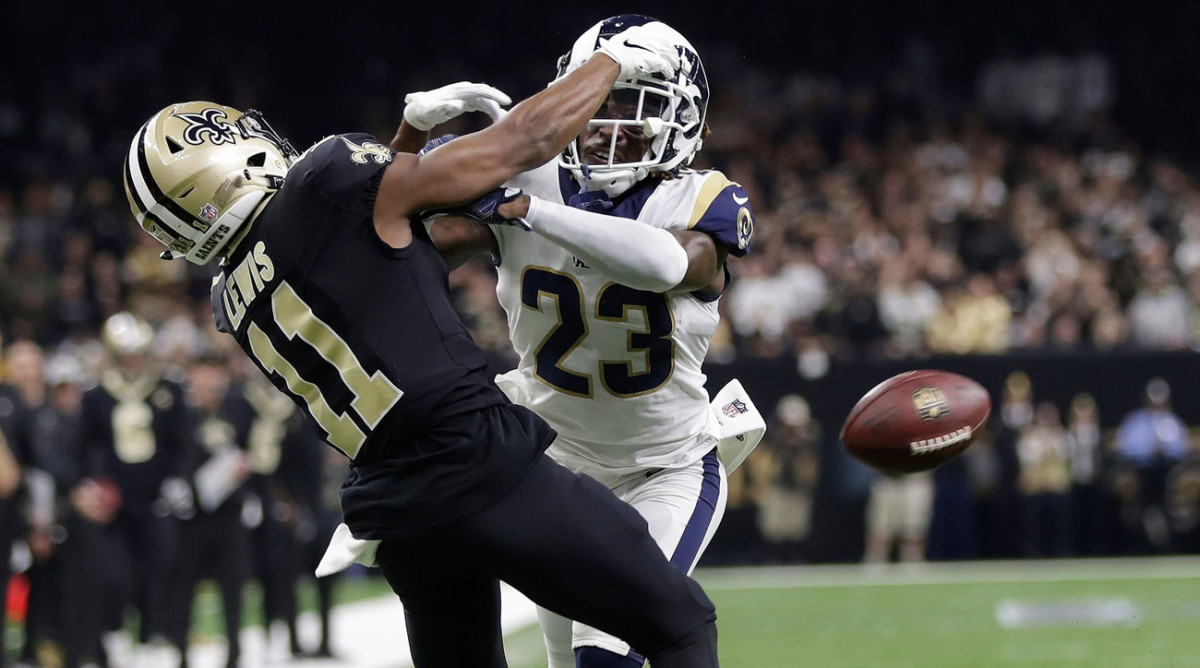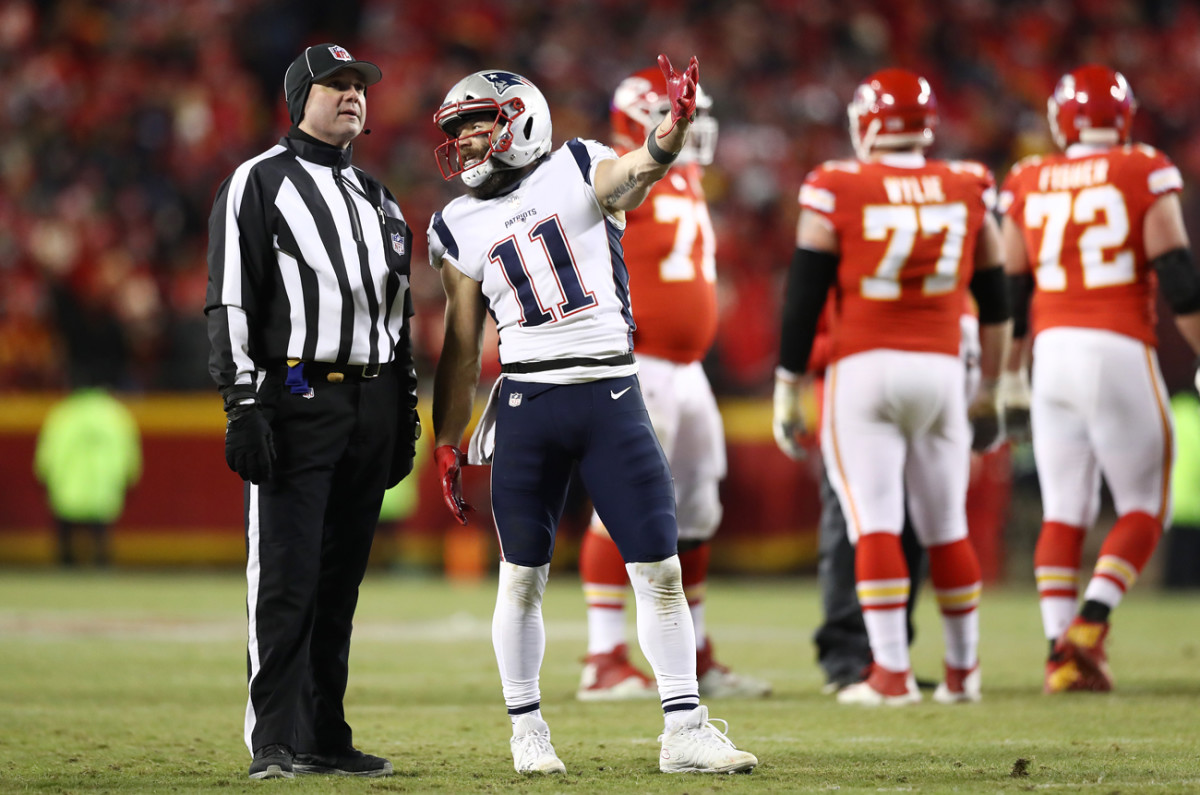Is the NFL Just Too Hard to Officiate?

The argument has been the same for years now: We couldn’t possibly fathom what it’s like to officiate an NFL game.
The mental dexterity it takes to associate a piece of legislative minutiae from the league’s 89-page rule book with a millisecond-long flashpoint in a game played by the fastest and strongest people on earth. The years of expertise it takes to properly position yourself for an adequate view without railroading the play in progress. The fortitude it takes to trust your instincts and announce the findings to a stadium full of 75,000 disgruntled fans armed with beer bottles.
For the most part, it’s a functional comeback. The reasonable among us can deduce that officials have only become a consistent sponge for our misgivings after the advent of high-definition replays and the 48-camera broadcasts, all of which now feature a former referee paid to criticize the very thing he spent years trying to tell us was so difficult. Go back and watch a 1994 Bengals-Oilers tilt under the same microscope and gasp at the myriad crimes against officiating you’d uncover.

But what happens to that mystique when an NFC Championship Game swings on a late fourth-quarter call so painfully obvious that it produces a near instant apology from the head of officiating? On Sunday, I watched from a perch about 100 yards away as Nickell Robey-Coleman demolished Saints wide receiver Tommylee Lewis while the ball was still in the air and not get flagged for either of the two infractions he committed on the play— pass interference and a helmet-to-helmet collision. Both were evident even from my vantage point, where the players were about the size of pocket chess pieces. The call cost the Saints a chance at a first down inside the Rams’ 5-yard line, and an opportunity to whittle most of the remaining 1:45 off the clock before attempting a point-blank field goal that would have ended the game. Instead, the Rams got the ball back with that 1:41 left. You know the rest.
I stood next to Robey-Coleman in the locker room after the game, and watched as he saw the play for the first time on another reporter’s cell phone. He laughed, grabbed him by the arm and shoulder and said: “Aw hell yeah, that was PI [pass interference].” He admitted that it was a busted coverage, and he simply “whacked [Lewis’s] ass” to keep him out of the end zone.
BRANDT: NFL must upgrade technology in the wake of Sunday’s officiating
“I did my part,” Robey-Coleman said. “The referee made that call. We respect it. Now I’m going to the Super Bowl.”
It wasn’t the only high-profile controversy. The Rams could have claimed a couple face mask penalties that weren’t flagged. In the AFC game, the Chiefs were victimized by a phantom roughing call on Tom Brady, and K.C. got away with a blatant pick by Chris Conley that freed up Sammy Watkins for a long gain, to set up a late touchdown. The crew needed Zapruder-like video scrutiny to determine whether Julian Edelman’s finger had grazed the ball on his apparent muffed punt (call overturned) and whether Chris Hogan had retained possession on a diving reception (call upheld). There were surely countless more such instances throughout the season.
But what if Sunday’s debacle was not just the league’s referees getting pantsed at the most visible moment of the season? What if it was about more than just a furious Sean Payton, alternating between uncontainable rage and helpless pre-tears once there was nothing left to do but air his grievances at the interview podium? What if this was the moment that blew all of our commonly held notions about officiating to pieces and made us really, truly question whether the game in its current state can be adequately overseen by referees at all?
ORR: How difficult would it be to institute video review of pass interference?
Players have never been faster. Almost every team has the ability and incentive to dramatically alter their tempo frequently. Plays themselves are designed to deceive the defense and often to create incidental contact that borders on illegality. And, underneath it all, referees must balance a Bible-sized tome of rules and clarifications against the fact that owners want a streamlined product that doesn’t lag, or adversely affect their most popular players. There are, it seems, as many unwritten rules to follow as the ones laid out in black and white.
And here’s a fact: For all the grumbling, these really are the best football officials in the world. The disastrous three-week lockout in 2012, which subjected us to the spectacle of replacement refs, showed just how difficult the job is and how shallow is the pool of professionals who can do it at the highest level. Remember how everyone clamored to bring back the real guys? And if they can’t do the job …

Sunday aside, have we simply started asking too much out of referees? Does the demand for constant, warp-speed perfection not only cause officials to miss incidental five-yard penalties but to momentarily freeze on subsequent plays, like a shortstop with the yips, when they try to move on? Could the weight of several consequential calls have already been on the mind of Bill Vinovich’s crew as they slept through one of the most stunningly egregious instances of pass interference this season?
We’ll never know, as officials are cloistered like monks in an abbey. Vinovich’s responses to a pool reporter after the Saints game were about as illuminating as Ikea instructions. If their jobs are reaching the point of impossibility, would anyone ever have the fortitude to come forward and admit that, without some serious consideration, we’re doomed to continue this self-defeating cycle?
BENOIT: The NFL must change its overtime rules
Even after everything, the argument is still valid. Of course the lay person couldn’t officiate an NFL game with any degree of accuracy. But an interesting question has risen in the wake of all this: Can anyone, really?
Question or comment? Email us at talkback@themmqb.com.
